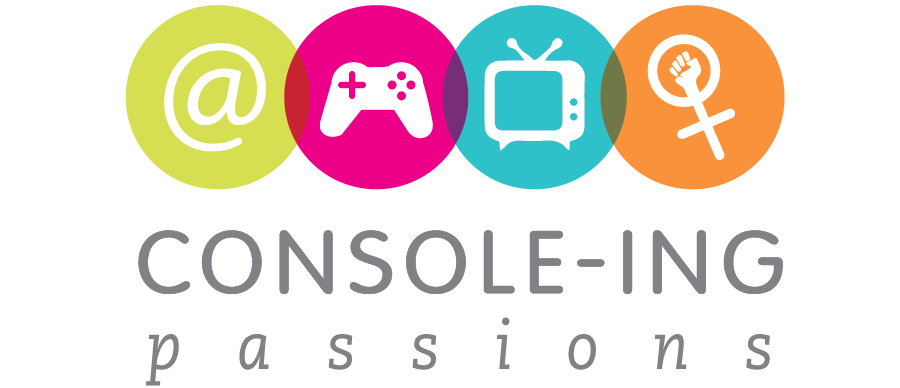This is my first time attending Console-ing Passions and I’m very excited to be on a panel pulled together by Alison Harvey and full of brilliant scholars! Here’s our panel description, followed by four different paper abstracts.
Here’s a shorthand for the papers:
- Rape ‘Jokes,’ Social Media Software, and the Politics of Moderation – me! 🙂
- Towards a Feminist Gaming Counter-Public – Alison Harvey and Stephanie Fisher
- Confronting “Unspeakable Things:” Digital Media, Rape Culture Activism and Affective Labour – Jessalynn Keller, Kaitlynn Mendes, and Jessica Ringrose
- Girl Power through Code – Tamara Shepherd
The New Feminist Public:
Gender and Labour in Digital Cultures and Industries
From revenge porn to cyberbullying to men’s rights activist threads, digital culture displays no shortage of implicitly sexist and virulently misogynistic practices and discourses. This is often attributed to online communities formed on platforms such as Reddit and 4Chan, explained away as the consequence of anonymity, and dismissed as part of some marginal, likely underage, fringe of Internet users. Simultaneously, coverage of these forms of “e-bile” (Jane, 2014) by a range of prestigious media venues such as The Guardian (Okolosie & Penny, 2014) and The New Statesman (Lewis, 2011) indicates that the visibility of these forms of gender-based harassment and hostility, particularly directed towards female-identified producers of content, are on the rise, even as growing scholarly inquiry indicates that ‘trolling’, as this has often been dubbed, has characterized online realms since their widespread adoption in everyday life (Herring et. al., 2002; Coleman, 2012).
This panel maps marginalized experiences of gender and labour within digital media industries, practices, and cultures, including digital games, programming education, blogging communities, and social media software. Collectively, these papers consider both opportunities and challenges for the production of new feminist publics in the midst of this volatile digital media culture.
Papers:
Rape ‘Jokes,’ Social Media Software, and the Politics of Moderation
Rena Bivens is a Banting Fellow in the School of Journalism and Communication at Carleton University. She is the author of Digital Currents: How Technology and the Public are Shaping TV News (University of Toronto Press, 2014).
Abstract: Popular for-profit social networking sites inevitably require some form of governance. It ought to be unsurprising that the systems of governance that develop, and the labour practices that maintain it, mirror the hegemonic, normalizing logics that regulate social life offline. One visible way of governing these sites is through moderation of user content. The moderation system designed for Facebook places the onus on the user to report offenses that are then assessed to determine whether the content should be removed and/or the offending user reprimanded. Facebook and other social networking sites outsource the labour required to assess reported content. On February 16th, 2012 Facebook’s moderation manual was leaked to the media by a 21-year-old “disgruntled employee” from Morocco who received “$1 per hour to trawl through the reports” (Arthur, 2012). From an analytical perspective, the manual is a treasure trove of insightful illustrations of social and political pressures, including specific practices that regulate and normalize gender and sexuality on the site. This paper contextualizes Facebook’s moderation practices by situating them within the broader critique of Facebook’s software and social space as constitutive of a systemic ‘gender problem.’ Analysis pivots around the specific case of the 2011 ‘rape joke’ pages that incited major controversy, culminating in mainstream press, petitions, and campaigns that successfully encouraged major advertisers to cancel contracts. Given that early iterations of Facebook’s software did not include a reporting feature, this paper unravels the evolution of Facebook’s moderation practices and the assemblage of actors that mutually shaped them.
Towards a Feminist Gaming Counter-Public
Alison Harvey is a Lecturer in Media and Communication at the University of Leicester. Her book, Gender, Age, and Digital Games in the Domestic Sphere, is forthcoming from Routledge in Spring 2015.
Stephanie Fisher is a PhD Candidate in Education at York University. Her work on games and gender has appeared in a range of venues, including Feminist Media Studies, Information, Communication & Society, and Loading… the Canadian Journal of Game Studies.
Abstract: This paper explores the example of feminist interventions into the notoriously sexist realm of digital games production. On the one hand this domain can seem to be the height of exclusion and hostility, with the ready examples of documented hatred and harassment including the cases of critic Anita Sarkeesian, designer Zoe Quinn, and writer Jennifer Hepler, the Dickwolves controversy at the Penny Arcade Expo and other tales of sexism at industry conventions, the recent #GamerGate controversy accusing female producers and researchers of corrupting games journalism, and the numerous examples of subtle and overt gender-based exclusions in the workplace captured by the #1reasonwhy hashtag. On the other hand, the visibility of these cases and the ways in which they have been linked to structural issues rather than individual problems can showcase the success of a growing if varied feminist movement in this domain. In this paper we trace the contours of this feminist games counter-public, providing an expansion and complication of Salter & Bodgett’s (2012) framing of the ‘new gaming public’ as one of male privilege, exclusion, harassment, and exclusively misogynistic gatekeepers. We consider in particular the role of activism in games production through Canadian examples of feminist grassroots initiatives aimed at forging an inclusive space of production for female-identified game-makers from a range of ethnic, age, experience, and class backgrounds. As this initially reactive group has become more established, it has changed the public face and context of digital game production in Canada in significant ways, a shift we explore in this talk.
Confronting “Unspeakable Things:” Digital Media, Rape Culture Activism and Affective Labour
Jessalynn Keller is a Lecturer in New Media at Middlesex University London. Her book, Girls’ Feminist Blogging in a Postfeminist Age is forthcoming from Routledge in late 2015.
Kaitlynn Mendes is a Lecturer in Media and Communication at the University of Leicester. Her most recent book, Slutwalk: Feminism, Activism, and Media is forthcoming from Palgrave in 2015.
Jessica Ringrose is a Professor of Sociology of Gender and Education at the Institute of Education, University of London who has written extensively on young people’s digital sexual cultures. She is author of Post-Feminist Education? Girls and the Sexual Politics of Schooling (Routledge 2012), and co-editor of Deleuze and Research Methodologies (with Rebecca Coleman, 2013).
Abstract: There has been recent public attention to how sexism and misogyny operate as a significant part of Internet culture (Herring et al, 2002; Jane, 2014; Mendes, forthcoming). Often centering around threats of rape, images portraying violence toward women, and conversations normalizing sexual harassment, feminists understand these practices as producing a widespread “rape culture” that transverses online and offline spaces (Rentschler, 2014). While activist campaigns challenging these threats have been publicized, we know little about the lived experiences of girls and women who participate in such activism. Why does one give their labour to feminist campaigns online? How do gender, race, class, age, and other identities shape one’s experience as an activist? And what affects emerge for girls and women who engage in projects that confront the violent images and words normalized within rape culture?
We address these questions through an analysis of early data from an AHRC-funded project examining digital media activism and rape culture. Drawing on interviews with feminist activists, we explore digital activism as a form of “emotional” or affective labour (Hochschild, 1983; Shaw 2011, 2012) that is often obscured within popular narratives of (digital) activism. Situating our argument within theories of the digital economy (Terranova, 2000), this paper challenges problematic framings of digital activism as half-hearted, meaningless, easy, feel-good activism known as “slacktivism” (Gladwell, 2010) or “armchair activism” (Lim, 2013) by uncovering and analyzing not only the affects that surround such activism, but a gendered labour necessary to produce and sustain these activist campaigns.
Girl Power through Code
Tamara Shepherd is an LSE Fellow in Media and Communications at the London School of Economics and Political Science. Her work on the feminist political economy of digital culture has been published in Convergence, First Monday, Triple C, and the Canadian Journal of Communication.
Abstract: This paper considers the precarious status of women working in masculinist technology sectors in relation to increasingly visible programs for teaching girls how to code. The assumption behind many such programs, including Google’s high-profile Made With Code initiative, is that girls’ lack of interest in programming constitutes the primary reason for tech’s gender gap. Private companies like Google are not alone in their attempts to rectify the disparity by targeting girls – teaching girls to code has been a key site for digital education in non-profit and state sectors as well. These initiatives tend to share an empowerment message directed squarely toward girls as idealized subjects in a tech-driven digital economy. The rhetoric of programs teaching girls to code, characterized by individualism, meritocracy, and determinism, serves a dual purpose: it valorizes the neoliberal project of postfeminism while also eliding the often misogynist culture of technology and computer science, as typified in the figure of the “brogrammer.” In this way, while postfeminist programs for teaching girls to code may succeed at interpellating girls into code culture, they won’t necessarily achieve eventual gender parity in high-status technological labour given the deep-seated cultural, rather than specifically educational, barriers to women in programming.
Works Cited
Arthur, C. (2012). “Facebook’s Nudity and Violence Guidelines are Laid Bare.” The Guardian, 21 February. Available online: http://www.theguardian.com/technology/2012/feb/21/facebook-nudity-violence-censorship-guidelines
Coleman, G.E. (2012). “Phreaks, Hackers, and Trolls: The Politics of Transgression and Spectacle.” In The Social Media Reader, edited by Michael Mandiberg, 99–119. New York: New York University Press.
Gladwell, M. (2010). “Small Change: Why the Revolution will not be Tweeted.” The New Yorker, 4 October. Available online: http://www.newyorker.com/reporting/2010/10/04/101004fa_fact_gladwell?currentPage=all
Herring, S. Job-Sluder, K, Scheckler, R. & Barab, S. (2002). “Searching for Safety Online: Managing ‘Trolling’ in a Feminist Forum.” The Information Society: An Internal Journal 18(5), 371-384.
Hochschild, A. (1983). The Managed Heart: The Commercialization of Human Feeling. Berkeley: The University of California Press.
Jane, E.A. (2014). “‘Your a Ugly, Whorish, Slut’: Understanding E-bile.” Feminist Media Studies 14(4), 531-546.
Lewis, H. (2011). “‘You Should Have Your Tongue Ripped Out’: The Reality of Sexist Abuse Online.” The New Statesmen, 3 November. Available online: http://www.newstatesman.com/blogs/helen-lewis-hasteley/2011/11/comments-rape-abuse-women
Lim, M. (2013). “Many Clicks But Little Sticks: Social Media Activism in Indonesia.” Journal of Contemporary Asia 43(4), 636-657.
Mendes, K. (forthcoming 2015). Slutwalk: Feminism, Activism & Media. Basingstoke: Palgrave.
Okolosie, L. & Penny, L. (2014). “Sexists and Racists are Resorting to Online Sabotage. But They Still Won’t Win.” The Guardian, 18 June. Available online: http://www.theguardian.com/commentisfree/2014/jun/18/sexist-racist-online-sabotage-wont-win-posing-online-feminists-leftists
Rentschler, C. (2014). “Rape Culture and the Feminist Politics of Social Media.” Girlhood Studies 7(1), 65-82.
Salter, A. & Blodgett, B. (2012). “Hypermasculinity & Dickwolves: The Contentious Role of Women in the New Gaming Public.” Journal of Broadcasting & Electronic Media 56(3), 401-416.
Shaw, F. (2011). “(Dis)locating Feminisms: Blog Activism as Crisis Response.” Outskirsts 24. Available online: http://www.outskirts.arts.uwa.edu.au/volumes/volume-24/shaw
Shaw, F. (2012). “‘Hottest 100 Women:’ Cross Platform Discursive Activism in Feminist
Blogging Networks.” Australian Feminist Studies 27(74), 373-387.
Terranova, T. (2000). “Free Labor: Producing Culture for the Digital Economy.” Social Text 18(2), 33-58.

